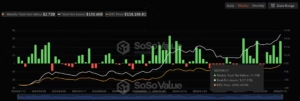The U.S. stock market demonstrated resilience on Thursday, buoyed by exceptional earnings reports from tech giants Microsoft and Meta. This positive economic news comes at a time when investors are increasingly anxious about the ramifications of an escalating trade war between President Trump and China. The Nasdaq Composite index excelled, concluding the day 1.52% higher, primarily driven by a remarkable 7.6% surge in Microsoft’s stock price and a 4.2% increase in Meta’s shares.
Both Microsoft and Meta reported quarterly profits that exceeded analysts’ expectations, effectively easing concerns about the potential negative impacts of tariffs and global uncertainties on Big Tech’s revenues from artificial intelligence, cloud services, and advertising. This unexpected positivity in earnings has helped stabilize investor sentiment, paving the way for a bullish session on Wall Street.
Despite the overall upward movement, the S&P 500 also managed gains, rising by 0.63%, while the Dow Jones Industrial Average increased by 0.21%. This marked the longest winning streak of the year for the Dow, a reassuring sign that markets are adapting even in the face of slowing economic growth. Notably, weekly jobless claims reached a two-month high, and U.S. GDP contracted in Q1, heightening expectations of a weaker labor market ahead of the critical jobs report scheduled for Friday.
As the market looks forward, attention is shifting toward future earnings reports from other significant players like Apple and Amazon, both of which are grappling with the challenges posed by U.S. trade policies. Amazon has confirmed it will not pass tariff costs down to consumers, while Apple is striving to shift iPhone production out of China to mitigate potential impacts.
- Investors remain cautious yet optimistic as they anticipate the upcoming earnings.
- McDonald’s reported a decline in demand, impacted by tariffs, with U.S. sales slipping and shares dropping 2%.
- Amidst these challenges, there might be encouraging news, as Beijing hints at the possibility of resuming trade talks with Washington.
While investor confidence appears to be on the mend, experts caution against complacency, as significant variables—like the potential for renewed trade discussions and their outcomes—could drastically influence market conditions. If the White House can successfully navigate through current tensions and strike beneficial deals, it may alleviate some of the burdens weighing on sectors affected by tariffs.







